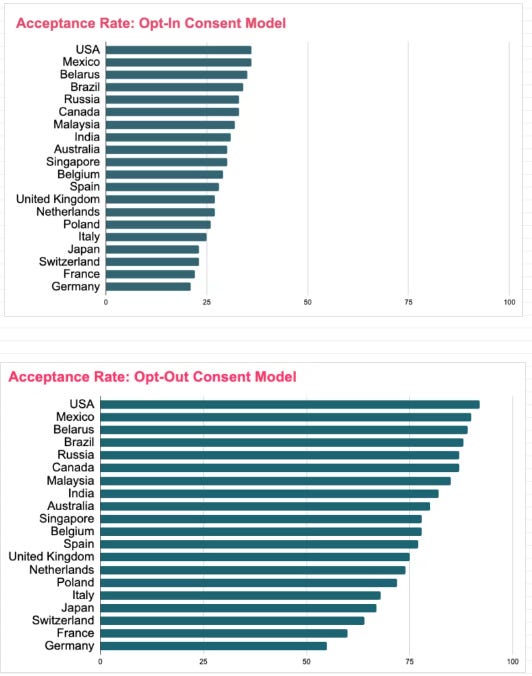The Power of the Default
Google thinks defaults are worth $26 billion. That might be an undervaluation.
I was not a great science student at school - I ended my pre-med career in undergrad around the third class of one of the pre-reqs when I realized how unequipped I was for that level of science instruction. Plus, the labs were like four hours long and I didn’t have time for that.
One thing that has stuck with me is Newton’s first law of motion: An object at rest stays at rest and and an object in motion stays in motion. In other words, things (just like people!) hate change. This law leads to the definition of inertia, which is the resistance that an object has to change its motion (or lack thereof.) The law of inertia is one we encounter everyday - both physically and psychologically - and it’s actually the underpinning of the government’s case against Google in their anti-trust action.
Google Gets It
On Monday of last week, a federal judge out of the DC circuit ruled that not only was Google a monopoly, but it abused that monopolistic power when it came to internet search. A lot of the precedent was set in the Microsoft case from 2000 (which, ironically, likely led to the variables in the browser marketplace that allowed a then-innovative Chrome browser top rise to the dominance it enjoys today) with the central point being that by paying companies like Apple and other hardware manufacturers to make Google the default search engine in their devices, they illegally thwarted competition in that space.
Unlike Bill Gates and Microsoft - which pursued an exclusionary tactic in their contracts with PC makers - the Google contracts were generous to the device and browser makers by paying them upwards of $26 billion to simply use Google as the default search engine when a user put a query into a browser bar.
You might be asking yourself why Google would be willing to pay such a princely sum when a user could simply switch search engines on their phone or browser. Or, as Google’s lawyer’s argued, if the Google product was so superior that it led to such overweight representation in the search market, why would they need to pay people to use it by default?
The reality is that someone at Google paid attention in high school physics class and understood inertia. They knew (just as the government argued via myriad expert witnesses) that people weren’t going to change the default search engine in their phone or browser. An object at rest tends to stay at rest.

Opt-In vs. Opt-Out
The government’s case is backed by solid science as well as solid data. Those in the ad world understand the power of inertia in our dealings with consumers, particularly when it comes to another Google-affiliated boondoggle: the cookie.
The introduction of the EU’s General Data Protection Regulation (GDPR) created an interesting proving ground for the power of defaults when it comes to low-effort actions like which search engine to use or whether or not to accept cookies on your browser.
In the United States, web cookies are an opt-out exercise. Before GDPR, if you didn’t want a cookie dropped on your machine when you visited a website, you had to go into your settings and ask your browser specifically to not allow cookies. There’s no reliable data on what the rates were, but it was commonly cited anecdotally that ~95% of people were accepting cookies before GDPR and its ensuing online privacy revolution. To go into settings and change the default was simply too much.
Further, old habits die hard and even with the omnipresence of (counterproductive) cookie banners on websites, Americans just aren’t that interested in getting rid of the delicious internet treat.
Despite saying they’re weary of how their data are used, Americans are still opting into cookies in large numbers - some studies say up to half of them simply “Accept all cookies” just to move on from the question. In an opt-out scenario - where the inertia is simply that much stronger - Americans are flirting with 90% acceptance of cookies.
What’s interesting about the opt-in/opt-out model is that even controlling for cultural differences, the acceptance rates in an opt-out model are vastly higher than in an opt-in model. Even half of the Germans - citizens of a notoriously privacy-conscious nation - are accepting cookies in an opt-out scenario.

And the EU knew this, which is why there is so much language in GDPR about informed consent and why there’s now a virtual cottage industry of opt-in mechanisms. Brussels understood - like the very tech companies they are trying to regulate - that inertia is a scientific law that knows no national boundaries. Everyone is subject to it.
Which is why at the end of the day, the fact that Google was only paying $26 billion to get browsers and hardware makers to have Google be the default for search (in other words, to make people opt out of it if they didn’t like it) was probably a bargain. When you make over $175 billion on advertising on your Search and other products a year, spending a fraction of that to get people into your ecosystem - while illegal under the Sherman Anti-Trust Act - would be obvious to anyone with a high school understanding of physics.
Grab Bag Sections
WTF Steve Kerr: Someone needs to explain to me how Jayson Tatum - NBA champion, the next likely face of the NBA, the 2K25 cover player, All-NBA player - got so few minutes in Paris for the Olympic Games. I’m a fan of Steve Kerr but I’m with Bob Cousy on this - it’s an embarrassment. This, on top of keeping Jaylen Brown off the team, is going to be incredible fuel for Boston on the chase for banner 19.
We’ve talked about Boston’s victimhood - deserved or not. But there really is no good reason Tatum didn’t get more playing time here. I feel bad for Golden State Warrior fans and the rest of the NBA when the Celtics channel post-suspension Bill Belichick and start running up the score on everybody. I’m talking dunks with 10 seconds left in a 20-point blowout level of petty. And I am here for it.
It’s JT and JB vs. everybody for the 2024-2025 NBA season and if I’m a West Coast team I’m terrified. If I’m an East Coast team, I’ve already made peace with my god that the Celtics own me after such an “easy run” in the 2023-2024 playoffs. You’re going to need 5 Draymond Greens running linebacker tackles to stop this Celtics team.
Jayson Tatum went to Paris and all he got was motivation to destroy the rest of the league next season, a gold medal, and some solid rest. Thanks, Steve.
Album of the Week: I will forever be upset with Jamn 94.5. In high school I went to Monster Jam, which had an incredible lineup that year. I was particularly looking forward to Nappy Roots, who has just dropped Watermelon, Chicken & Gritz and were taking advantage of their newfound star status by opening up for the likes of Eve, Jay-Z, Busta Rhymes, Ludacris, Diddy - it was a who’s who of hip hop royalty. However, whoever set up their mics at the Fleet Center was not on their A game that night and we could barely hear them in the nosebleeds where me and my friends were sitting. For shame, Jamn 94.5. For shame.

For a debut studio album, this thing punches well above its weight. “Hustla” is a great intro to each member’s rapping style. “Ballin’ on a Budget” was essentially how I lived in high school and college. “Awnaw” may very well be the best song on the album. And to have “Slums” and “Po’ Folks” one after the other as contrasting tracks is something you very rarely see on a first major album like this one. Even the end of the record with “Dime, Quarter, Nickel, Penny,” “Kentucky Mud,” and “Life’s a Bitch” is solid (though, to be fair, the album starts stronger than it ends.)
I was excited to see their careers take off, but it’s quite hard in a rap collective to keep all the parties together long-term. W,C&G was followed up with a solid sophomore album in Wooden Leather, but without a major label backing them with marketing budgets combined with the departure of Prophet from the group their move to go independent for their third album came with less reach and recognition in an ever-crowded space as major labels lost more and more talent to streaming and internet releases.
Still a great album and a huge nostalgia spin for me (not sure about the rest of the group from that cold fall Boston night given the aforementioned mic issues). Give the album a whirl and see what western Kentucky brought to the rap game.
Quote of the Week: “It is awfully hard work doing nothing.” - Oscar Wilde
See you next week!






